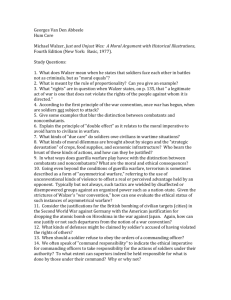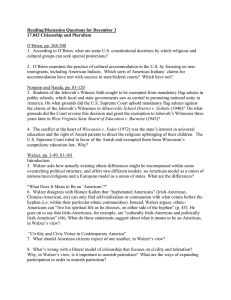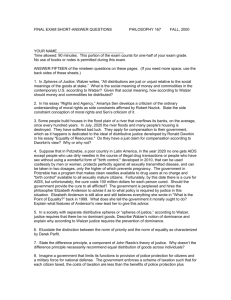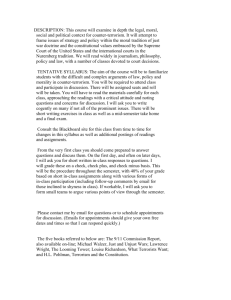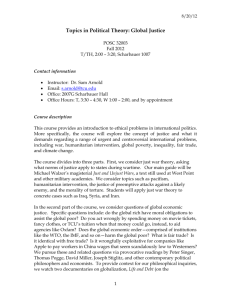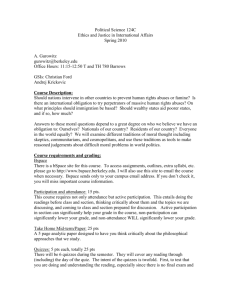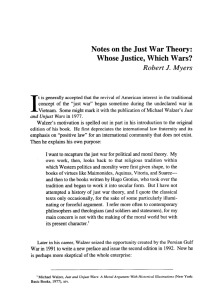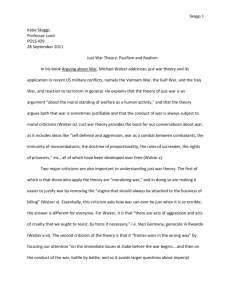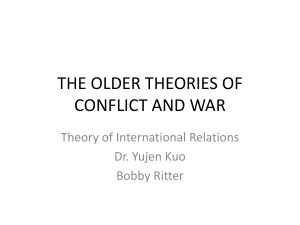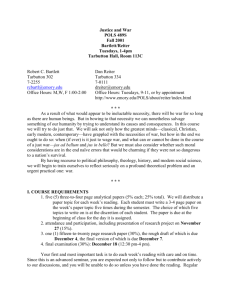Walzer, Just and Unjust Wars
advertisement
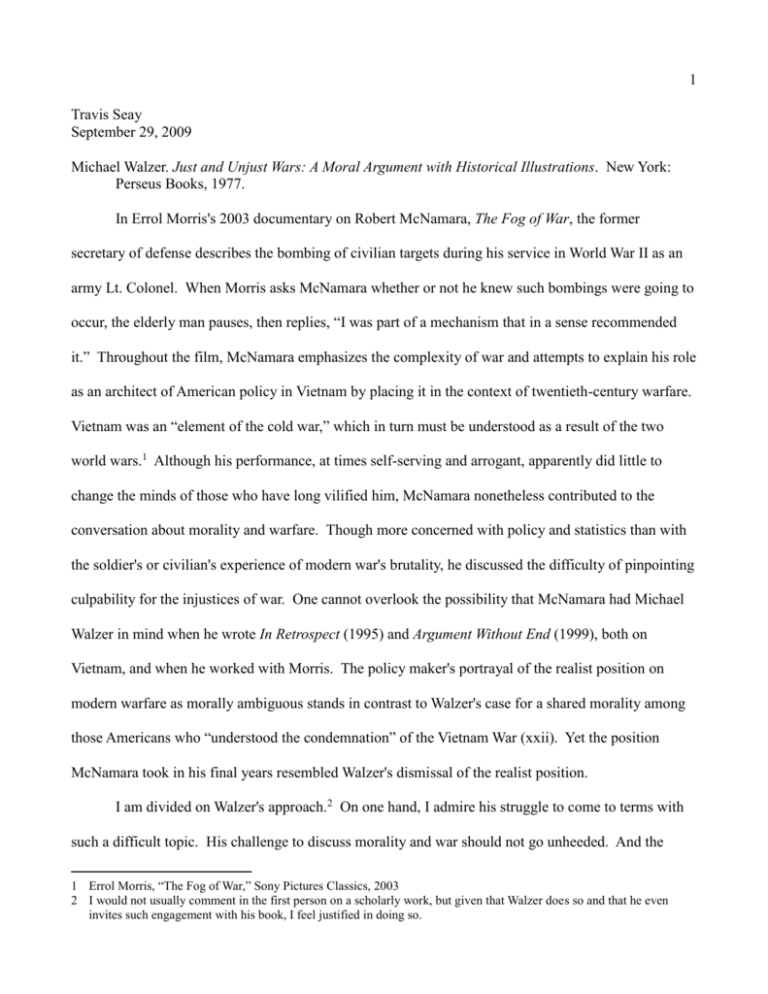
1 Travis Seay September 29, 2009 Michael Walzer. Just and Unjust Wars: A Moral Argument with Historical Illustrations. New York: Perseus Books, 1977. In Errol Morris's 2003 documentary on Robert McNamara, The Fog of War, the former secretary of defense describes the bombing of civilian targets during his service in World War II as an army Lt. Colonel. When Morris asks McNamara whether or not he knew such bombings were going to occur, the elderly man pauses, then replies, “I was part of a mechanism that in a sense recommended it.” Throughout the film, McNamara emphasizes the complexity of war and attempts to explain his role as an architect of American policy in Vietnam by placing it in the context of twentieth-century warfare. Vietnam was an “element of the cold war,” which in turn must be understood as a result of the two world wars.1 Although his performance, at times self-serving and arrogant, apparently did little to change the minds of those who have long vilified him, McNamara nonetheless contributed to the conversation about morality and warfare. Though more concerned with policy and statistics than with the soldier's or civilian's experience of modern war's brutality, he discussed the difficulty of pinpointing culpability for the injustices of war. One cannot overlook the possibility that McNamara had Michael Walzer in mind when he wrote In Retrospect (1995) and Argument Without End (1999), both on Vietnam, and when he worked with Morris. The policy maker's portrayal of the realist position on modern warfare as morally ambiguous stands in contrast to Walzer's case for a shared morality among those Americans who “understood the condemnation” of the Vietnam War (xxii). Yet the position McNamara took in his final years resembled Walzer's dismissal of the realist position. I am divided on Walzer's approach.2 On one hand, I admire his struggle to come to terms with such a difficult topic. His challenge to discuss morality and war should not go unheeded. And the 1 Errol Morris, “The Fog of War,” Sony Pictures Classics, 2003 2 I would not usually comment in the first person on a scholarly work, but given that Walzer does so and that he even invites such engagement with his book, I feel justified in doing so. 2 decision to base his case for moral conduct on the assumption that war is probably not eradicable but that the conduct of war need not eschew moral standards allows for a compelling philosophical position that validates some of the realities of war as experienced by soldiers and civilians. On the other hand, I find that his analyses of particular wartime cases do not adequately investigate the nature or definition of modern warfare. Too little context exists around his arguments to connect the previous century's wars to one another or to identify industrialized warfare as a phenomenon that resists some of the moral positions Walzer takes. To what extent, for example, do decisions become mechanized, as in the case of McNamara's work during World War II? Although Walzer devotes a chapter (chapt. 19) to the responsibilities of soldiers and their officers, and although he provides numerous examples of wartime behavior, it seems hard to justify moral judgments of behavior that are based on “historical illustrations,” unless those illustrations accompany a fuller description of war's effects on the mind. Walzer uses Karl von Clausewitz's On War to describe the conventional logic of armed conflict. According to that explanation, war escalates as each side reciprocates the actions of the other. But Walzer rejects the claim that “war is hell.” The tyranny of war is not limitless, he writes. “Certain criminal acts within the hell of war” are condemnable (23). The deliberate, and in some cases incidental, killing of civilians deserves condemnation. But it seems that Walzer overlooks the steady rise in the percentage of civilian deaths during the twentieth century. That trend requires one to ask about the nature of modern warfare. One can condemn such destruction of life, but it seems just as practical to condemn war itself. Besides reciprocal strategies and nervous soldiers, what accounts for unnecessary deaths? To what extent, for example, have advancements in military technology depersonalized the experience of killing and thus contributed to rising civilian deaths? How might such considerations alter moral assessments of wartime behavior? Thus rises an important question concerning agency. At what levels of authority does agency lie? And to what extent can even morally valid opposition to particular decisions produce more just 3 conditions? He does not demonstrate that collective opposition to injustices is effective; in fact, he may demonstrate the opposite. He writes, for example, that those Americans who acted out of moral concern against the Vietnam War—and thus behaved responsibly—became fractured over how to proceed. One does not get a sense of Walzer's opinion as to the effectiveness of the antiwar movement. British city dwellers who experienced the terror of German bombs during the Second World War tended to oppose the reprisal bombing of German civilians (while most people in the countryside supported reprisals); yet the state reciprocated the act. The American war in Vietnam represented a counter-intervention: a response to covert actions by North Vietnam. In this view, U.S. involvement balanced the operations of another power. However, Walzer argues that “when the U.S. did intervene militarily in Vietnam. . . it acted not to fulfill commitments to another state, but to pursue its own contrivance.” Vietnam became an American war fought “in someone else's country” (99, 101). Throughout the book, Walzer challenges ideas of the realists. For example, the realist position critiques the “crusading ideology” of modern democratic cultures which requires the shutdown of the enemy's system before victory can be declared. The doctrine of unconditional surrender is seen most clearly in World War II. This orientation, argue the realists, draws from the Wilsonian creed that sees peace as normative. Realists object to what they see as the idealist democratic view on the grounds that it results in unnecessary deaths. But Walzer sees Wilsonian statements as overstated in realist critiques of “idealism.” He makes the case against the notion that Wilsonian policies demanded unconditional surrender. As with civilian deaths that occur through conventional battle, terrorism is indefensible. And “[t]hough the terrorist raid is aimed at civilians, the reprisal must not be so aimed—nor should civilians be “incidental victims” (217). Walzer has very little to say about this in the preface to the book's fourth edition. Toward the end of the book, he reinforces the importance of war conventions. We must hold 4 onto them, he writes, “until the very last minute,” letting go of them “only in the face of an imminent catastrophe” (232). Given the attention he focuses on noncombatants elsewhere, it is troubling that Walzer lets go of the opportunity to address their relevance to civilians in 2006. In his defense, accurate figures of civilian deaths are hard to come by. Nonetheless, McNamara's dictum regarding such data—that “proportionality should be a guideline in war”3—serves as a reminder that the topic deserves more attention than it currently receives. In his review of Walzer, Hedley Bull points out an inconsistency and a couple of omissions. Although Walzer writes that nuclear weapons defy the concept of just war and implies that we should not even threaten to use them, he says that they may nonetheless be effective as instruments of deterrence.4 Further, Walzer does not make an adequate attempt to come to terms with the notion of absolute pacifism. Bull also asks whether revolutionaries are obligated to respect the rules of war if they believe they are fighting for a just cause.5 It is not that Walzer's ideas 3 Morris, “Fog of War.” 4 Hedley Bull, Review of Just and Unjust Wars, by Michael Walzer, World Politics 31 (July 1979): 595. 5 Ibid., 597.
